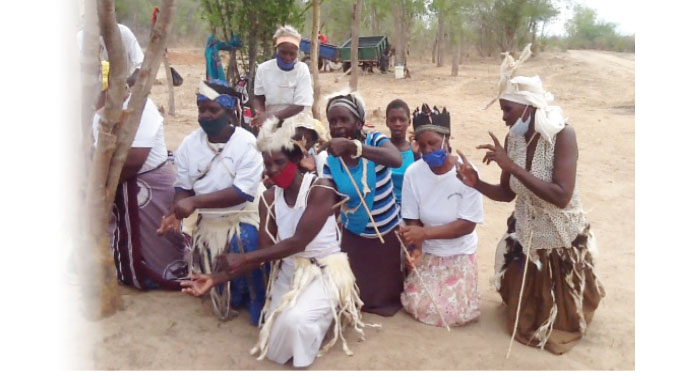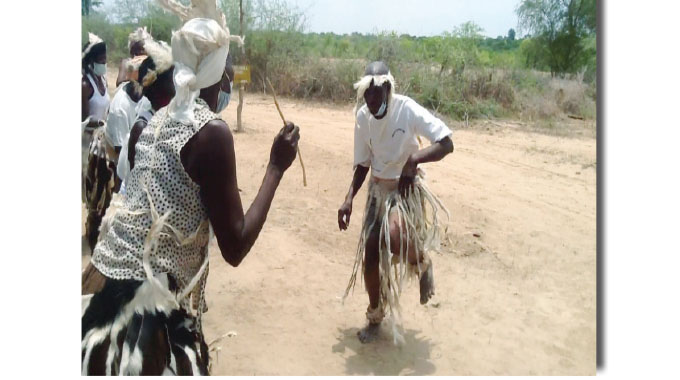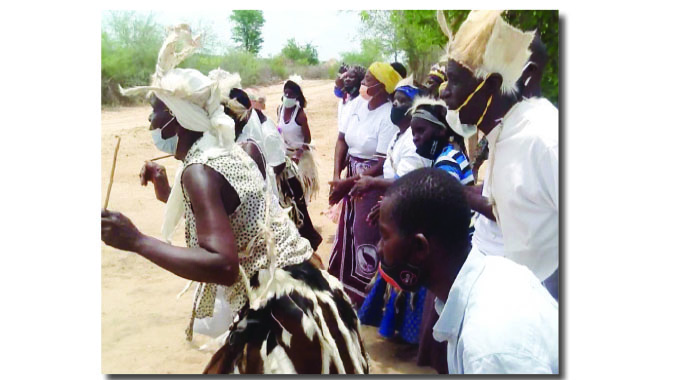
The Sunday News

Bruce Ndlovu, Sunday Life Reporter
ON a cloudless Thursday afternoon, as the sun threatens to fry everything it sets its unblinking gaze on, Philemon Ncube gathers his choir of elderly men and women under a tree that barely offers any shade.
The Nkosi Lobengula choir has gathered at the spot locals call Cross Malunku, on the intersection of King Lobengula Road and Nkayi-Lupane Road in Lupane, to relive history in melody.
The song about Lobengula’s crossing of the Shangani River and his disappearance is one that many can sing by heart. However, when it is sung by the old men and women of Cross Malunku, right at the intersection of the road that King Lobengula trod on before he disappeared a few kilometres on, it acquires an added layer of significance.
This is more so on the first week of December when, back in 1893, the battle between Amabutho and the forces that were in hot pursuit of the King is said to have taken place. As their feet hit the dust, disturbing dry earth and sending plumes of dust rising into the air, they seek to re-enact the rhythmic but deadly dance of bygone warriors that once pitted their spears against the merciless hail of the recoil operated Maxim gun on the banks of the Shangani River. In the voices of community members in that remote village in Malunku, are titbits of information that seem to have evaded history’s pages for over a century.

“The songs tell the story of his story,” choirmaster Ncube told Sunday Life.
They compress such a long story of the King’s story into small pieces that allow the people to always remember. One of the songs says “inkosi yachaphela emdwadweni yaphumula emtswirini”. These are the areas that tell us where the King passed as he came all the way from Bulawayo and where he rested. These are things that you won’t find in any history book but it’s all there in the songs.”
Although Ncube, as the choirmaster, says that the group has always existed, it was only in 2016 after Cont Mhlanga started taking an interest in the area that they began singing with some kind of organisation. Malunku is a poverty-stricken place, with villagers usually mostly preoccupied with the search for water, with no boreholes or any other water sources in the area.
“Our choir practices on specific days. We have days that are sacred to people here, for some its Wednesday and for others its Thursday. On these days, our people do not go into the fields and that is when we use the opportunity to practise as a group. We operate with the knowledge that people are trying to make a living as well.

“I am the choirmaster but my wish is for us to all rise up and attain a level of success as a community. This is not just about me but all of us as a community. Maybe if people out there could recognise what we do and see this place, as well as hear what we can do as a choir, then maybe we could get regular jobs or something that benefits the community could be built here. Whatever I get, has to benefit the community because we are all working together trying to keep this area’s traditions alive,” Ncube said.
Only a few metres away from where Ncube and his choir gathered that day, a building has begun to take shape. It is only a recent development in an area where shops or health facilities can be an entire day’s walk away.
“Right now, the problem was getting the right costumes for them so that they become performers with dignity,” Mhlanga said. “It’s something that wouldn’t take a fortune but it would change their lives and changing their lives transforms the whole community. As you can see, you can drive for kilometres here before seeing the nearest shop.
But right now, ever since the Pupu-Shangani Festival started, there is now a shop being built and the more people come here, the more services will also come. That is when we can say art is truly for development and can change lives.”
While they might live in a sea of poverty and hardship on the banks of the Shangani, the elderly people who sing so sweetly about a King’s journey into the unknown regarded his decision to rest where they have also built their lives as proof that they are also special.
After all, they sing about landmarks and events that happened a stone’s throw away from their own homes.
“This is one of the few communities where you find the older people so heavily invested in the arts. Usually when we talk performing arts, we are talking about younger people but here this whole community is held together by its history and heritage,” he said.
Ernest Dzobani, the head at Malunku Primary School said they had hoped that as the historical and cultural significance of the area was recognised, more people would visit and help build up the profile of the village as a tourist destination.
“It saddens me that an area such as this, an area with a lot of historical significance does not have a lot of basic amenities. If the history of this place is recognised, I am sure that it would also help the local community. There is no water and there are no toilets in the area. As teachers, we can always get jobs elsewhere anytime and lead a different kind of life.
However, we are not thinking of ourselves but the community here. We are talking about the women and children who have to grow up in an area with such rich history yet languish in poverty without the basics provided for,” he said.
At the war memorial site, the Government has already refurbished a tapering stone pillar set up as a landmark while General Mtshana Khumalo, who led the Ndebele forces, was declared posthumously a National Hero by President Mnangagwa as the Government moves to correct accounts of the Pupu-Shangani battle.

The obelisk, which is riddled with bullet holes, has 34 names of Major Wilson’s patrol inscribed on it.
For Ncube, the most urgent task is to teach the children in the community the songs that chart King Lobengula’s journey.
“We are trying to teach the children as well. Unfortunately, they cannot join us in the earlier part of the day because of school. I do have a programme running with them and go around the schools in the area teaching them these songs so that one day, when we are not here, they can be able to continue this tradition and continue telling the story of King Lobengula and his journey to our little part of the country,” he said.



